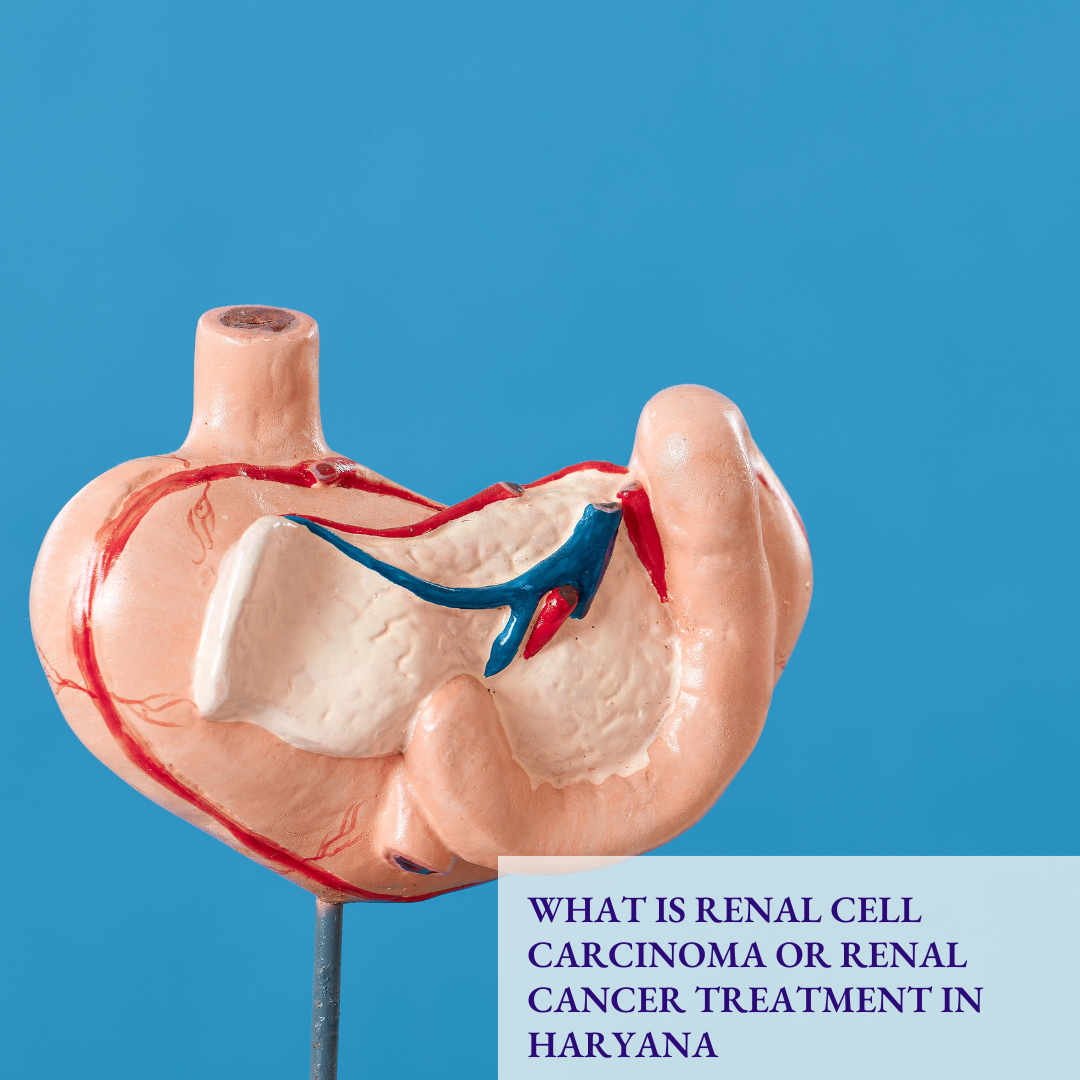Renal cell carcinoma (RCC) is the most common type of kidney cancer found in adults. It begins in the lining of the small tubes in the kidney. These tubes help filter blood and make urine. In recent years, more cases are being diagnosed early due to improved scanning techniques. But still, many people only learn about the disease when it has grown or spread. Knowing the signs early and starting treatment quickly gives the best chance of recovery
This article will help you understand renal cancer, its types, causes, symptoms, diagnosis and treatment options. We also share helpful insights about treatment availability in Haryana
Understanding Renal Cell Carcinoma
Renal cell carcinoma starts in the kidney cells called renal tubules. These are tiny parts that help clean the blood. RCC makes up nearly 90% of all kidney cancers. It tends to grow as a single tumor within a kidney. However, in some cases, it can affect both kidneys or multiple parts.
RCC usually grows slowly, but it can be aggressive in later stages. If not treated in time, it may spread to other parts like the lungs, bones, or brain. This is known as metastatic renal cell carcinoma, and it requires a more advanced treatment plan.
Causes and Risk Factors of RCC
While doctors cannot always explain why RCC happens, some key factors raise your risk:
- Smoking: This doubles the risk of RCC.
- Obesity: Excess fat may change hormones and cause cancer cell growth.
- High blood pressure: It damages kidney function and raises cancer risk.
- Family history: If a close relative had kidney cancer, your chances increase.
- Long-term dialysis: Patients on dialysis for many years may develop kidney cancer.
- Certain genetic conditions: Like Von Hippel-Lindau disease, which affects kidney cells.
Signs and Symptoms to Watch
Many early-stage RCC patients have no symptoms. It is often found by chance during tests for other issues. But as the tumor grows, common signs include:
- Blood in urine (pink, red, or cola-colored)
- Persistent pain in the side or back
- A lump or swelling in the side
- Fatigue and weight loss
- Fever not caused by infection
- Anemia or low red blood cells
If you see any of these symptoms, see a nephrologist in Haryana or visit a nearby hospital quickly.
Understanding the Stages of Renal Cancer
Doctors use renal cell carcinoma staging to plan treatment. It tells how far the cancer has spread. The stages of cancer kidney include:
- Stage I: Tumor is small (less than 7 cm) and limited to the kidney.
- Stage II: Tumor is bigger but still inside the kidney.
- Stage III: Cancer spreads to nearby lymph nodes or blood vessels.
- Stage IV: Cancer spreads to other organs (lungs, bones).
Staging helps doctors choose the right treatment method.
How RCC is Diagnosed
To detect RCC, doctors use several tests:
- Urine tests to check for blood or infections.
- Blood tests to measure kidney function.
- Ultrasound or CT scans to find tumors or swelling.
- MRI to get a clearer picture of soft tissues.
- Biopsy: In some cases, doctors may remove a small tissue sample to confirm cancer.
These tests also help doctors learn the stages of renal cancer and decide if surgery is possible.
Common Treatment Options
The treatment depends on the stage, size, and type of tumor. Here are some options:
1. Surgery (Nephrectomy)
This is the most common treatment for RCC. It involves removing part of the kidney (partial nephrectomy) or the entire kidney (radical nephrectomy). Surgery is often the first step if the cancer hasn’t spread far.
In spine fracture operation and similar procedures, laparoscopy (keyhole surgery) is also used to reduce recovery time. For renal cell carcinoma, such less invasive options are now available at top kidney hospitals in Haryana.
2. Targeted Therapy
These drugs block signals that cancer cells use to grow. Medicines like sunitinib and sorafenib are often used in metastatic renal cell carcinoma cases.
3. Immunotherapy
This treatment boosts the immune system to fight cancer cells. Drugs like nivolumab and pembrolizumab show good results, especially in later stages.
4. Radiation Therapy
Radiation helps control pain or bleeding in advanced cases. It is not the main treatment but is used when cancer spreads.
5. Cryotherapy and Radiofrequency Ablation
These are less common treatments. They destroy small tumors using cold gas or radio waves. They are mostly used in patients who cannot have surgery.
Final Thoughts
Renal cell carcinoma is a serious condition, but it is treatable if caught early. With better awareness and access to care, survival rates have improved. If you are in Haryana and need expert care for RCC or any kidney disease, trust only the best.
Patients from across the state visit the hospital for kidney cancer, hydronephrosis, and other kidney disorders. If you need trusted RCC treatment or looking for the best kidney hospital in Haryana, SS Kidney Urology Hospital is the right choice.
Visit our official website or book a consultation today to begin your recovery journey.






Comments